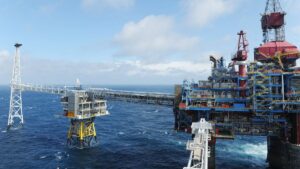The developers of a new 35MW solar project in south-east Queensland – backed by software billionaire Mike Cannon Brookes – is taking the Palaszczuk government to court over the state’s new rules that govern large-scale solar installations and effectively ban unskilled labourers from carrying and loading thousands of solar modules.
RenewEconomy learned on Tuesday that the developers of the Brigalow Solar Farm, Impact Investment Group, had filed legal action at Queensland’s Supreme Court last Friday.
As we have reported, the rule – which was rushed through by the state Labor government, and enacted on May 13 – requires developers of solar projects of 100kW and larger to use licensed electricians, only, to mount and fix solar panels.
The move has been greeted by anger and confusion from solar developers in the state, who say it will drive up the costs of projects, and blow out construction schedules as companies scramble to find licensed electricians willing and able to do a job normally relegated to unskilled labourers.
IIG, which has declined to comment on the legal action, is presumably facing these very challenges on the Brigalow project, which is in its early stages of development near Pittsworth. It is one of only two large scale solar farms that have not yet completed the solar module installation, although many installers of large rooftop solar systems are also affected.
In emailed comments on Tuesday, the Clean Energy Council said it supported the legal action, but was “deeply disappointed” there was a need for any company to pursue it in the first place.
“We believe that the new regulation is inconsistent with the Queensland Electrical Safety Act, as it affects activities that are not classified as electrical work under that legislation,” said the CEC’s director of energy generation, Anna Freeman.
“The Brigalow Solar Farm feels obliged to challenge the regulation through the courts because the industry has been unable to resolve the matter in discussions with the government since the regulation was announced in April.
“In our view, this regulation will increase the costs of projects, reduce employment opportunities for local communities, and lead to a downturn in clean energy investment in Queensland, without delivering any safety benefit,” Freeman said.
For IIG, whose Solar Asset Fund offers investors a portfolio of large-scale solar farms that sell clean electricity into Australia’s spot markets, the significance of this legal challenge no doubt extends beyond the Brigalow project.
The Fund, which was set up by renewable energy industry heavyweights, including Chloe Munroe (chair) and Lane Crockett (ex Pacific Hydro), launched its third investment round at the start of this year.
Its previous investment round, which reached “first close” last July after notching up $55 million in commitments, attracted some impressive names, including Cannon-Brookes, the tech investor and co-founder of Atlassian and one of the country’s richest people.
And its first open, in May 2017, raised more than enough to fund its first two assets; The Swan Hill Solar Farm and the Chinchilla Solar farm, in a short six-week fundraising period.
The 19MW Swan Hill Solar farm reached practical completion in July 2018, and the 20MW Chinchilla Solar Farm started sending electricity into the market during December 2018.
IIG has also snared Future Super as a key investor, with the fossil-fuel free superannuation company taking “a sizeable position” in the fund.
In January, Crockett – who heads up renewable infrastructure at IIG, said it was “fantastic” to get started on Brigalow Solar Farm. “It’s another solar asset into the Fund so we can open it up to a new community of investors,” he said.
The CEC says it will continue to “pursue and encourage opportunities for dialogue with the Queensland government and other stakeholders, to seek swift resolution of this dispute,” in parallel with the legal action.










